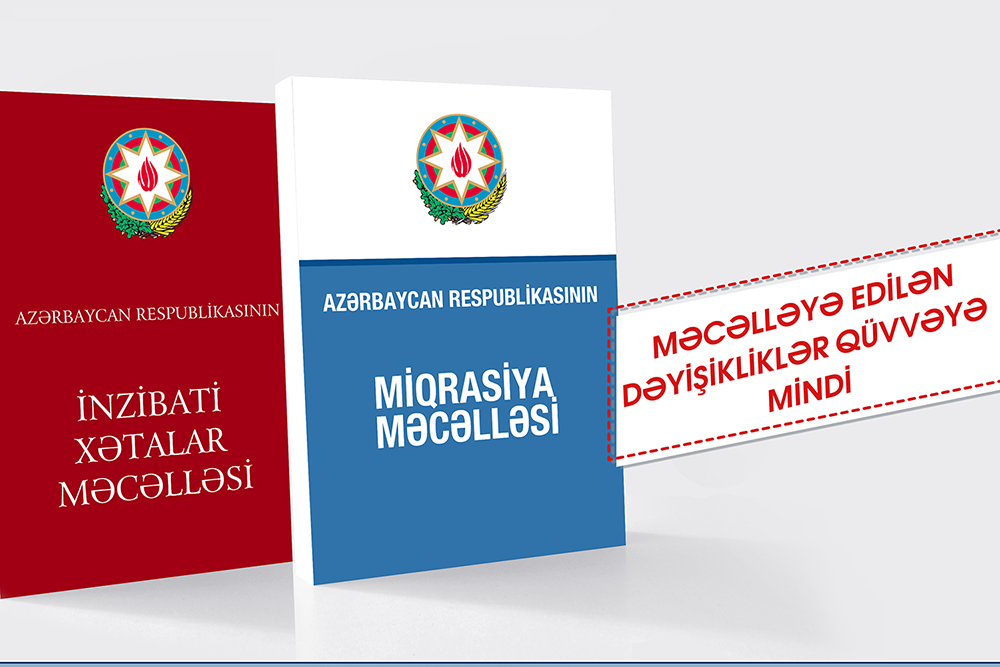Amendments to the legislation of the Republic of Azerbaijan related to migration entered into force
The laws of the Republic of Azerbaijan on making amendments to the Migration Code and Code of Administrative Offenses signed by President of the Republic of Azerbaijan Ilham Aliyev and the amendments to the legislation have already entered into force in order to improve the migration processes in the country in line with the modern requirements.
According to the amendment to the legislation pursuant to Article 21 of the Migration Code foreigners or stateless persons who wants to stay temporarily in the Republic of Azerbaijan for more than 15 days not 10 days will get registered upon place of stay.
According to the previous legislation if foreigners and stateless persons’ permissions for stay and residence in the country, as well as for work are cancelled according to the relevant basis provided by the legislation, in any case those persons were being expelled from the country and their entry to the country were being restricted. Restriction on the entry of a foreigner (stateless person) to the country for a certain period of time in many cases created certain difficulties for the business sector, and entrepreneurs. According to the relevant amendments to the law, in case the grounds for cancellation of foreigner’s and stateless permission for stay, residence or work in the country are removed then the ban on entry of that person to the country will be lifted.
Based on the previous version of the Migration Code if a foreigner or stateless person has been brought to administrative responsibility twice or more in the last three years for violating migration legislation, his entry into the country were being restricted for a period of five years. According to the changes, the provision of the Migration Code stipulating imposition of restriction on entry of a foreigner or stateless person to the territory of the country for a period of five years for the relevant grounds was repealed.
Another issue is about foreigner’s and stateless person’s departure and re-entry to the country who have been subjected to administrative corrective measures in the form of administrative fine for violation of migration legislation. From now on, for violating migration legislation foreigners and stateles persons who have been subjected to administrative corrective measures in the form of administrative fine without administrative expulsion will be able to leave the country without any restrictions on re-entry to the country if they do not pay the fine. In this case, their entry to the country is restricted until they pay the fine and after paying the fine restrictions imposed on their entry to the country are immediately lifted. Thus, there will be no need to additionally apply for lifting of the restriction. This approach will have a positive impact on increasing satisfaction in regulation of migration processes.
According to the amendments, when an application for a permanent residence permission is rejected, a mechanism regulating the issuance of a temporary residence permit on the basis of the documents submitted by that person is being established . So that according to the change foreigners or stateless persons who have been rejected permanent residence permission will be able to apply to State Migration Service with an application form without submitting additional documents for obtaining a temporary residence permission.
When it comes to add endum of new Articles 150.15 and 150.16 to the Code of Administrative Offenses if a person does not pay the fine within one month from the day the decision on application of administrative corrective measure in the form of administrative fine comes into legal force 1 percent of the penalty amount will be charged as a late fee for each subsequent day, but not for more than 2 months. In practice, it was observed that, a foreigner or stateless person who is brought to administrative responsibility in most cases was not interested to pay the fine imposed because the amount of administrative fine, did not change irrespective of the duration. The change serves to encourage foreigners to pay administrative fines and, in a certain manner, to increase the sense of responsibility.
Generally, the purpose of amendments to legislation relating to migration is to improve the situation of citizens, foreigners and stateless persons, labor migrants, increase the satisfaction, ensure transparency, create conditions for more effective use of rights by foreigners and stateless persons having family ties and business relations in the country.
 The Republic of Azerbaijan
The Republic of Azerbaijan .png)

